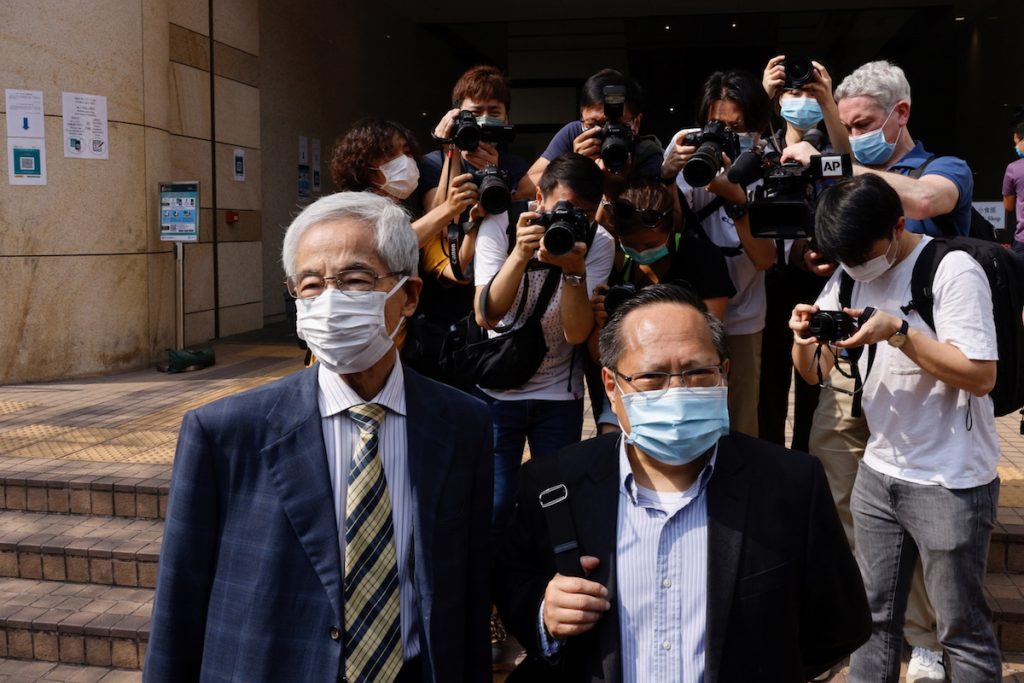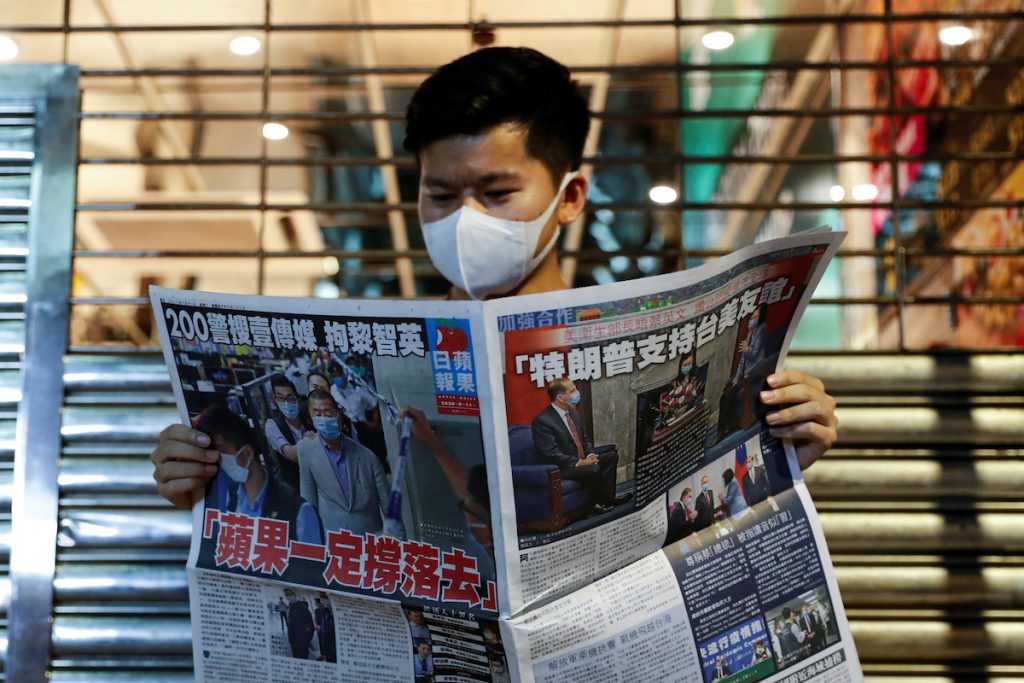Hong Kong newspaper publisher and Beijing critic Jimmy Lai will serve 14 months in prison for taking part in an unauthorized assembly during the 2019 mass pro-democracy protests in the Chinese-ruled city.
Lai was found guilty in two separate trials for unauthorised assemblies on Aug. 18 and Aug. 31 2019, respectively. He received a 15-month sentence for the first, reduced by three months in mitigation, and an eight-month sentence for the second, of which he will serve two.
District Court Judge Amanda Woodcock said even though the Aug. 18 assembly was peaceful there was a “latent risk of possible violence” and that a deterrent sentence and “immediate imprisonment” was appropriate.
Martin Lee, who helped launch the city’s largest opposition Democratic Party in the 1990s and is often called the former British colony’s “father of democracy,” was given a suspended sentence of 11 months in one of the same cases as Lai.
Eight other pro-democracy activists were to be sentenced April 16 after they were found guilty of participating in unauthorized assemblies during anti-government protests in 2019.
It would be the first time that Lai, one of Hong Kong’s most prominent democratic activists, who has been in jail since December after being denied bail in a separate national security trial, will receive a sentence.
About 100 people, including foreign diplomats, queued outside the court early on April 16 to get a seat for the hearing.
Lai was found guilty in two separate trials earlier in April for illegal assemblies on Aug. 18 and Aug. 31 2019, respectively. The maximum possible punishment is five years in prison.
His repeated arrests have drawn criticism from Western governments and international rights groups, who raised concerns over waning freedoms in the global financial hub, including freedom of speech and assembly.
In the Aug. 18 case, District Court judge Amanda Woodcock found him guilty together with Lee. As he entered the court on April 16, Lee said: “I feel completely relaxed, I’m ready to face my sentence.”
Lee served in the city’s legislature for over two decades. A forceful orator, who helped found the city’s first major pro-democracy party, he has long advocated engagement with China, to seek common ground in moving forward. But in a recent Reuters interview, however, he was more guarded.
“They don’t want Hong Kong people to have hope for a full implementation of one country, two systems,” he said of the mainland leadership.

Lee, a longtime pacifist embracing the activism and philosophy of Martin Luther King Jr. and Mahatma Gandhi, is haunted by the Chinese military’s massacre of students and other civilians in and around Beijing’s Tiananmen Square in 1989.
The barrister said he thought it was a mistake for Hong Kong’s protesters to resort to violence because “you give an excuse to the other side to use violence, and how can you beat them with violence?”
The 82-year-old Catholic has been nominated for the Nobel Peace Prize this year.
Also found guilty
The other defendants, also found guilty, included prominent barrister Margaret Ng and veteran democrats Lee Cheuk-yan, Albert Ho, Leung Kwok-hung, Cyd Ho, Au Nok-hin and Leung Yiu-chung. The latter two had pleaded guilty.
In her mitigation speech, Ng said the law must not only be defended in courts or the legislature, but also in the streets.
“When the people, in the last resort, had to give collective expression to their anguish and urge the government to respond, protected only by their expectation that the government will respect their rights, I must be prepared to stand with them, stand by them and stand up for them,” she said.
In the second trial, the same judge found Lai and Lee Cheuk-yan guilty together with Yeung Sum. The Aug. 31 clashes were some of Hong Kong’s worst, with police firing tear gas and water cannons at pro-democracy protesters who threw petrol bombs. All three had pleaded guilty.
Lee Cheuk-yan posted on Facebook late on April 15 that he expected to go to jail but that his mind was “free as the ocean and the sky.”
Authoritarian grip
The 2019 pro-democracy protests were spurred by Beijing’s tightening squeeze on wide-ranging freedoms promised to Hong Kong upon its return to Chinese rule in 1997, and plunged the semi-autonomous city into its biggest crisis since the handover.
Beijing has since consolidated its authoritarian grip on Hong Kong by imposing a sweeping national security law, punishing anything it deems as secession, subversion, terrorism or collusion with foreign forces with up to life in prison.

Lai, founder of the Apple Daily tabloid, said the national security law was a death knell for the city.
He had been a frequent visitor to Washington, meeting officials such as then Secretary of State Mike Pompeo, to rally support for Hong Kong democracy, prompting Beijing to label him a “traitor”.
Lai was scheduled for two more court mentions on April 16, in the ongoing trial where he is charged with collusion with a foreign country and a fraud case related to the lease of the building which houses Apple Daily.
Earlier this week, the tabloid published a hand-written letter Lai sent to his colleagues from prison, saying: “It is our responsibility as journalists to seek justice. As long as we are not blinded by unjust temptations, as long as we do not let evil get its way through us, we are fulfilling our responsibility.”
The media mogul said the situation in Hong Kong is “falling apart before us and it is therefore time for us to stand tall.”
Lai was born to a rich family in mainland China in 1947. His family suffered once the communists took power in 1949, with his mother being sent to a labor camp. At the age of 12 he was smuggled into Hong Kong.
Cardinal Joseph Zen, bishop emeritus of Hong Kong, baptized him in 1997 the same year that the former British colony was returned to Chinese rule.
With Reuters






